How civil rights leader James Clyburn helped Joe Biden and Black America win the White House
COLUMBIA, S.C. – James Clyburn sat at a table in a slowly emptying ballroom on election night, his chin resting on his right fist as he mixed Jack Daniel’s from one glass and Diet Coke from another.
He watched the huge screen in the center of the room where MSNBC’s Rachel Maddow and Joy Reid announced state election results. South Carolina, as expected, was called for President Donald Trump. The crowd, wearing masks and spread out across the ballroom, groaned.
In the days leading up to Election Day, the House majority whip had campaigned across his home state pleading with South Carolinians to follow his lead, to vote for Joe Biden and his running mate, Kamala Harris. He called on them to support a younger generation in Congress who could take the lead.
There was a fish fry, a drive-in, an evening rally, watch parties, visits to polling sites and back-to-back interviews. It was an unforgiving pace and a risky one for an 80-year-old Black man in the midst of a pandemic.
As a young man, Clyburn had faced down baton-waving sheriff deputies so the next generation of African Americans could sit at any lunch counter, shop at any department store and go to any school. Now, here he was again, trying to make America live up to its promise of a just nation.
He was troubled by racial divisiveness ripping at the nation’s fabric, the novel coronavirus crippling Black and brown communities, the nation’s poor getting poorer. He feared another four years under Trump.
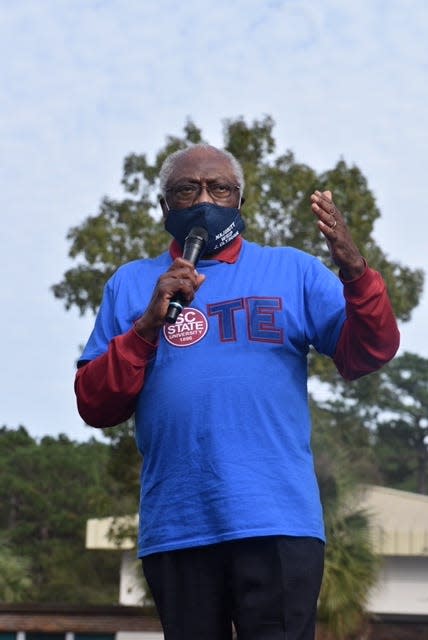
The recent deaths of the Rev. C.T. Vivian and U.S. Rep. John Lewis, his friends and fellow civil rights legends, made more urgent the need to ready the next generation of leaders.
At stake was the goodness of the country.
“This ain't about me. It's about my children, it's about my grandchildren, and all others that are similarly situated,’’ Clyburn said. “It’s all about the future.”
In the ballroom, Clyburn’s phone buzzed. He looked at his iPhone 11 and clicked the green accept button before stepping into the hall.
It was Joe Biden, calling to thank him.
“I would never be in this position, but for you,’’ Clyburn heard him say.
“You’re quite welcome,’’ Clyburn answered.
It wasn’t looking good. Trump had an early lead, including in key battleground states.
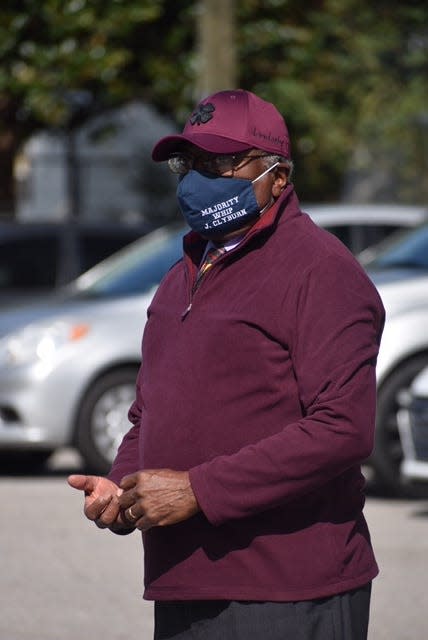
Clyburn walked out of the ballroom just past midnight, leaving behind half-empty glasses. He remained hopeful America would choose a different direction.
“I didn’t expect for it to be that tight,” Clyburn said. But “I never thought we were going to lose.”
A renewed fight for civil rights
Two days before Election Day, Clyburn stepped out of a black Suburban sporting well-worn Adidas sneakers and a T-shirt that read, “VOTE.” Inside the O was “SC State University 1896,” for his alma mater, South Carolina State University.
Clyburn pulled up his dark blue mask emblazoned with the words “Majority Whip J. Clyburn.”
The smell of fish frying filled the air, a nod to a Clyburn campaign tradition.
A gaggle of reporters thrust tape recorders toward his chest and asked about Biden’s prospects. “He's done much better in South Carolina than anybody thought he would,’’ Clyburn told them.
Clyburn is credited with helping revive Biden’s struggling campaign earlier this year. Just days before South Carolina’s primary, Clyburn gave Biden his coveted endorsement, helping him nail a decisive win and providing his campaign with unstoppable momentum.
Outside the community center in Hollywood, a small town near Charleston, Clyburn worked his way through the crowd. Some posed for pictures. Others swarmed in like he was a deacon bearing good news.
“Optimistic’’ by Sounds of Blackness boomed in the background.
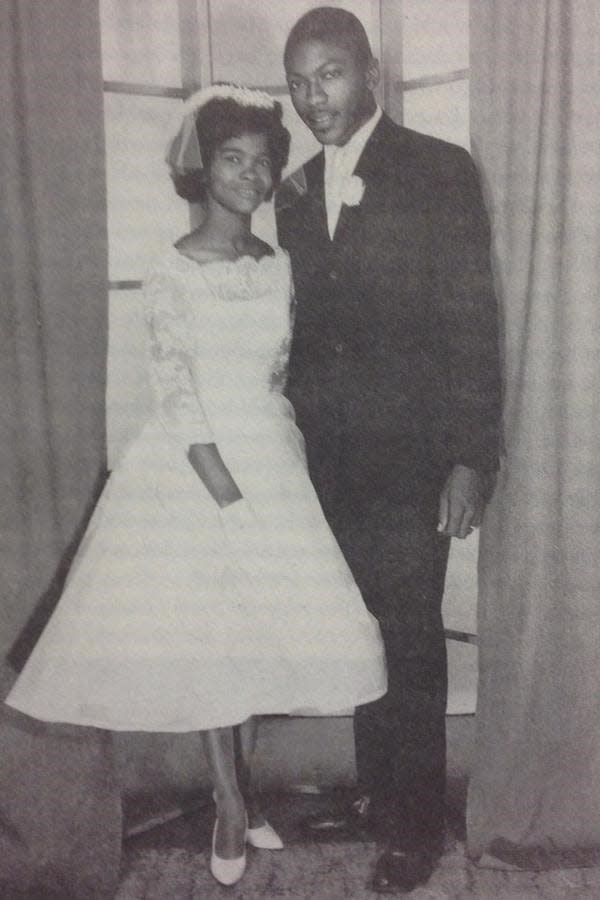
Clyburn grew up in a close family in the small city of Sumter.
In 1960, he and Lewis were both 20 years old when they met at the organizing meeting of the Student Nonviolent Coordinating Committee, a force in the civil rights movement. As a college student, Clyburn helped lead more than 1,000 students dressed in their Sunday best on a march downtown for a sit-in at segregated lunch counters.
It was one of many times when Clyburn’s activism landed him in jail. He was locked up when he met a fellow demonstrator and his future wife, Emily England. They would be married 58 years and have three daughters – Mignon, Jennifer and Angela – before she passed away last fall.
In 1992, Clyburn was elected the first African American to serve in Congress from South Carolina since Reconstruction. A wall in his leadership suite in the U.S. Capitol is lined with Black men who represented South Carolina in Congress in the late 1800s.
In his 27 years in Congress, Clyburn has pushed to restore a key provision of the 1965 Voting Rights Act; advocate for more funds for historically Black colleges and universities; and work to preserve civil rights landmarks and culture, including the Gullah/Geechee Cultural Heritage Corridor along the coast.
With the recent passing of Lewis, Clyburn said some colleagues see him as the “moral conscience of the Congress.’’
He wants others to fill that role.
“What he’s doing now is not just preparing, but making sure the next generation of leaders are overprepared for the moment,” said Antjuan Seawright, a political adviser to Clyburn.
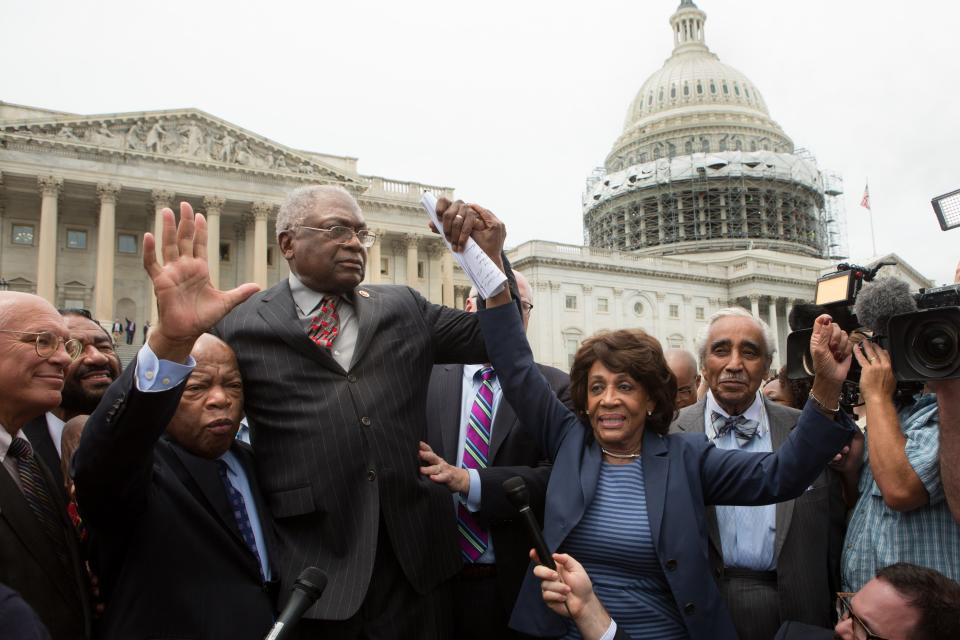
It had been months since Clyburn regularly campaigned in person. The pandemic had sidelined him. He lost a 79-year-old cousin, Almeta Sinclair, to COVID-19 in April.
With Election Day approaching, Clyburn ventured out.
“God keeps his angels safe,’’ Seawright said. “There’s no doubt that Jim Clyburn is one of God’s closest angels.”
On this Sunday, Clyburn was campaigning to get more Democrats in Washington, including South Carolina’s Jaime Harrison, who was running for the Senate, and U.S. Rep. Joe Cunningham, who was trying to keep his seat.
Clyburn hoped a victory for Harrison, a former aide and protege, over GOP Sen. Lindsey Graham, a staunch Trump ally, would send a signal that vitriol rhetoric and racial divisiveness were not acceptable, not in the South, not in the country.
“We will see a New South that is bold, that is inclusive, that is diverse, where all of our voices are valued and heard,” Harrison repeated in his stump speech.
Clyburn, who pushed for a Black woman to be on Biden’s ticket, also knew what it would mean if Harris won as the first woman vice president-elect and the first African American and Asian American to serve in the role. Her run had generated support and pride from an army of Black women, including his own daughters and granddaughters.

Clyburn was driven to stay on the campaign trail, including virtually, by what he saw as the unraveling of the country.
It bothered him that people had to take to the streets over police brutality and inequities, much like he and others did in the 1960s.
He was angry that the federal government hadn’t done enough to help Black and brown communities that have been hit disproportionately hard by the novel coronavirus. He heads an oversight panel on COVID-19.
Clyburn has complained about Trump’s efforts to strip away provisions of the Affordable Care Act, his attacks on mail ballots and his handling of the COVID 19 pandemic.
“We have a president who has decided that it’s much more important to win a political argument than to provide safety and security for all our citizens,’’ Clyburn told the crowd in Hollywood.
“Amen,” some shouted back.
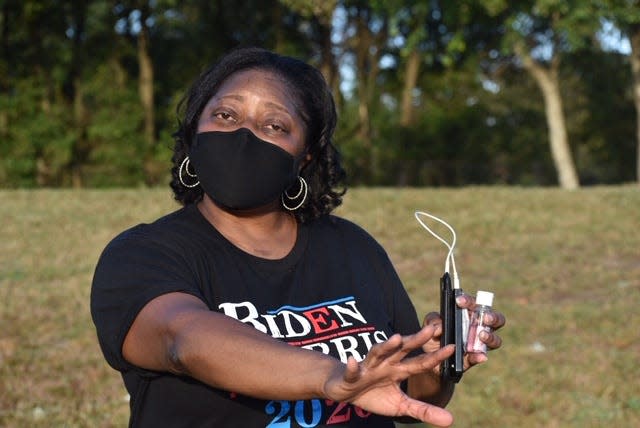
After the speech, Clyburn got back into the Suburban manned by his security detail for a 25-mile trip to North Charleston. He didn't have time to eat his fried whiting sandwich.
His next event was a drive-in rally to stump for Biden, Harrison and Cunningham. Clyburn ruled out climbing onto the back of a black pickup truck serving as the stage. He was too old for that, he told the crowd.
Parked on the front row, Nichole Green waved her Biden/Harris sign through her sunroof. She had waited for Clyburn to announce who he would endorse for the state’s primary before deciding on a candidate.
“When I heard it, I was like, ‘OK, here we go…That was the stamp of approval,” said Green, 46, a former director of the Old Slave Mart Museum in Charleston.
Cunningham said Clyburn’s backing matters.
“It speaks volumes to have him out here and to be shoulder to shoulder with this giant in history,” Cunningham said after the speech. “I don’t know if there’s any bigger endorsement in South Carolina.”
With his final campaign event done for the day, Clyburn climbed into the SUV and headed home.
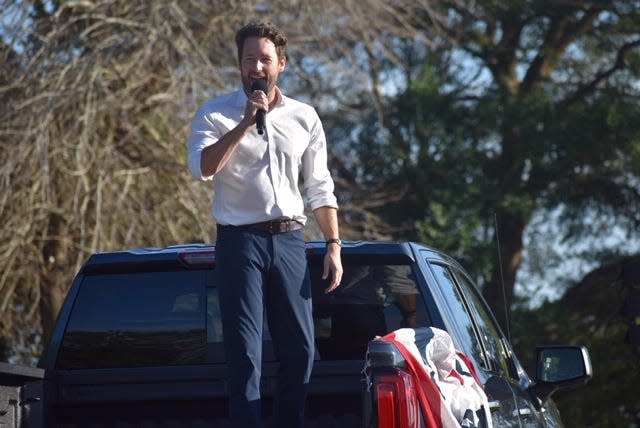
‘Restoring the goodness'
Early on Election Day, Clyburn’s Suburban pulled up to the polling site at the Greenview Park Community Recreation Center in Columbia.
He strolled over to a poll worker stationed at the door. The woman, sporting a blue Hillman College sweatshirt, stood as the congressman neared. Sharon Hanks knew him as “Mr. Clyburn who used to fuss at me.’’
“You don’t even know who I am,’’ Hanks said as she pulled down her surgical mask.
“Oh, Lord,’’ Clyburn said.
“Jim and Vivian Davis’ daughter,’’ she said.
“Yes!’’ he said. “How’s your mom doing?”
Inside, poll workers paused from eating lunch to greet Clyburn, bumping elbows and chatting about their families.
“You make me proud!’’ a woman shouted.

For Clyburn, community means helping others, like the Bible taught him. The son of a minister and chairman of the Democratic Faith Working Group, Clyburn said his faith is at the heart of every vote he casts and every decision he makes, including why he supports Biden.
“He is basically just a good, decent guy,’’ Clyburn said.
“This campaign is all about restoring the goodness of the American people. This country’s greatness is under threat because we’ve had a lack of goodness in the White House.”
He has been inspired by a favorite gospel song, "Stand'' by Donnie McClurkin.
“When there’s nothing left else to do you, just stand,’’ the song says.
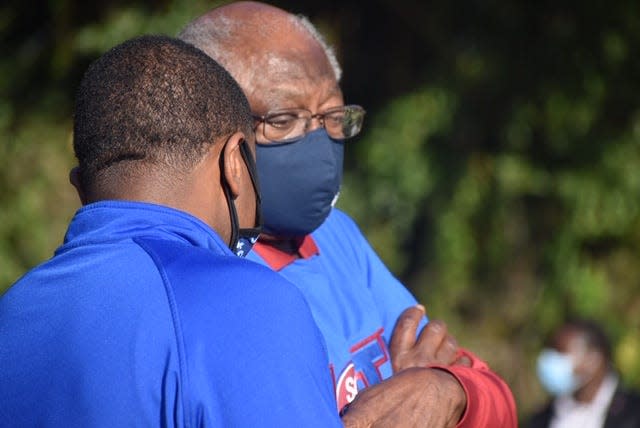
Clyburn had a wish list for Biden’s administration.
Tackle the deadly virus was at the top.
Next, he wants a presidential commission to study the impact of the 1986, 1988 and 1994 crime bills that sent thousands of Black people to prison over drug convictions.
“You've got to ask yourself, ‘How is it that a young person in South Carolina can end up in jail for 20 years for doing something that's legal in Colorado and some other states,’’ Clyburn said.
He also wants more broadband services in rural communities, community health centers and support for his program aimed at reducing poverty. He wanted a plan to provide safe drinking water, improve sewage systems and expand energy sources.
Those policies, Clyburn said, would help heal racial tensions driven by a lack of economic opportunities.
“People feel they’re being left behind,’’ he said. “When people see that everybody has a seat at the table, everybody benefits from the economy, then they don’t have to blame the other person.”
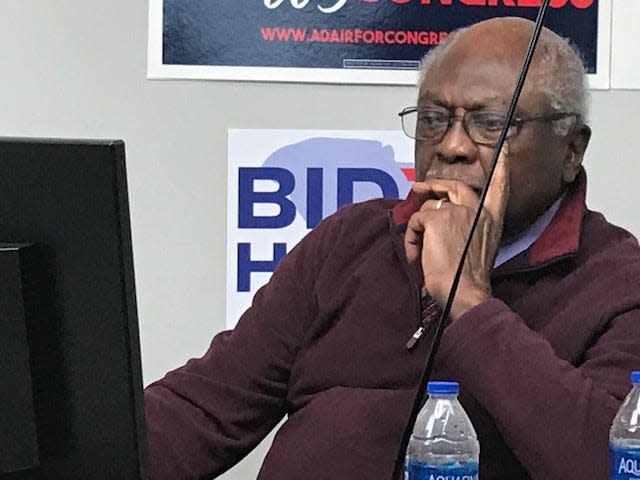
Getting Black voters to the polls
Polls were slated to close in a few hours. Clyburn sat in his campaign headquarters in Columbia determined to get more Black voters to support Biden.
A Trump win, he said, would end the nation’s pursuit of a “more perfect union.”
His office had been converted into a studio, with two folding tables, two black umbrellas and a studio light.
Clyburn did a quick interview on Fox News. He hopped on a call with a Black-owned gospel station where he urged listeners to vote before polls closed.
“It’s very serious,'' he warned.
There were more interviews: MSNBC, NPR, a British news station.
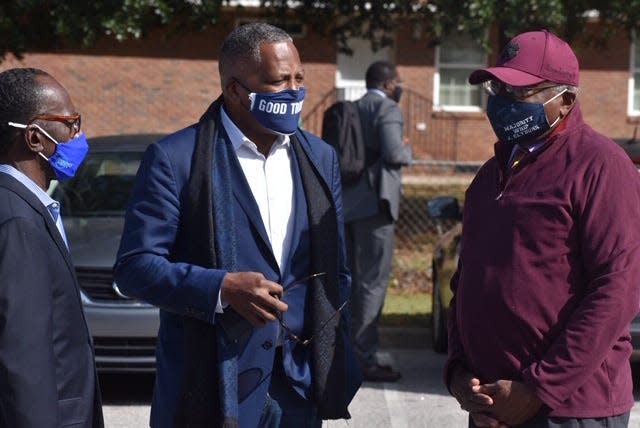
Clyburn turned down a request from another gospel radio station. He didn’t like that he was told he couldn’t talk about a particular candidate. They don’t do that for white guests, he complained.
In between interviews, Clyburn scrolled through his phone reading news reports. One polling site in North Carolina had a power outage and shut down for 45 minutes.
Traffic was slow in one precinct in Philadelphia because most people there had already voted. “That’s a good thing,’’ Clyburn said to nobody in particular.
On his desk was an almost empty bottle of water and books: “The Shame of the Nation: The Restoration of Apartheid Schooling in America,’’ by Jonathan Kozol and “On Her Own Ground: The Life and Times of Madam C.J. Walker” by A’Lelia Bundles.
Clyburn’s communications director, Hope Derrick, told the congressman that he was invited to stop by the watch party at the state Democratic party headquarters.
Clyburn nodded, but first he had a video call with the NAACP and voters.
“I can’t go until I finish,’’ he said.
His efforts wouldn’t be enough.

On election night in the ballroom, Clyburn staffers rushed over to his table and whispered in his ear. The Associated Press had called the Senate race. Harrison had lost his bid to unseat Graham.
Clyburn’s press team quickly packed up their laptops. The security detail moved into position. The boss wanted to speak at Harrison’s watch party across town.
Once there, Clyburn told Harrison supporters that Harrison may have lost the contest, but the young politician was still a winner. He had run a competitive race, generated interest among young people and set the stage for future races. The contest showed cracks in the state’s GOP armor.
Back in the ballroom there would be better news. Both Clyburns on the ballot had won. Clyburn stood with his back to the screen flashing national election results and saluted his youngest daughter, Angela. She had won a seat on a local school board.
But in the congressional races, Cunningham had also lost, leaving Clyburn again as the lone Democrat in the South Carolina delegation.
With that reality settled in, Clyburn stayed up late that Friday to hear what Biden would tell the nation. Clyburn was “damn tired.” Biden was supposed to speak at 8 p.m. He started near 11.
“You know what three hours out of the life of an 80-year old is?” Clyburn said.
Still, he listened to Biden promise, “We’re going to win.”
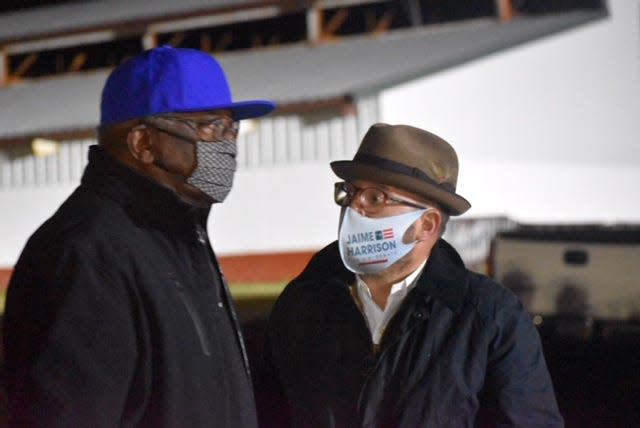
The next morning, Clyburn turned on the television while he made waffles and sausage for his family.
Anchors promised announcements about the race. But they had made those promises before. Clyburn decided to go on his regular weekend golf outing with his buddies.
He was at the 15th hole when a member of his security detail hurried over to tell him the race had been called. Clyburn kept playing.
“I was leading. I was winning all the money,’’ he said with a laugh.
Another officer came over and told him that Zoom calls were being set up at home. He had to leave.
Clyburn would later learn that Trump had also been on a golf course when news of Biden’s victory broke.
“I was having a better day than he was,’’ Clyburn said.

On the ride home, Clyburn thought about the challenges ahead, including getting legislation through Congress and onto Biden’s desk, especially if Republicans keep control of the Senate.
He wondered whether Biden and GOP Senate leader Mitch McConnell would work together. They had served together in the Senate before Biden served as vice president to President Barack Obama.
“I'm hoping that their relationship will be such that he will treat Biden better than he treated Obama,” Clyburn said.
Clyburn was proud that nearly 80 million Americans voted for Biden, but disappointed that nearly 74 million cast ballots for Trump.
He wasn’t surprised the nation was so divided. He grew up in the Deep South where he was banned from eating at whites-only lunch counters. He served in Congress with former segregationists. He heard Trump say there were “fine people on both sides” after white supremacists paraded through Charlottesville, Virginia, with torches in 2017 and a protester was killed.
“This country has been divided ever since 1619. This country had 244 years of slavery. That’s 10 generations. And then we went (through) another four, five generations of apartheid,’’ he said. “You have a president who has exploited the racial animus in this country. It’s against Black people. It’s against brown people. It’s against Jews. Anybody who ain’t like him. That’s a reality. If I go around getting mad about that I’ll be mad all day, every day.”
In coming days, as Biden names his top staff and Cabinet picks, Clyburn won’t be on the list. He was re-elected this month as the majority whip.
Clyburn encouraged colleagues jockeying for those posts. But he wasn’t interested.
This is my last job, he told them.
Follow Deborah Barfield Berry on Twitter at @dberrygannett

This article originally appeared on USA TODAY: How Joe Biden won with Black voters and a big push from James Clyburn
